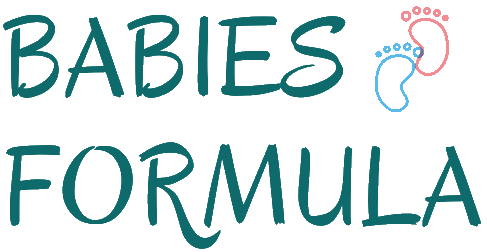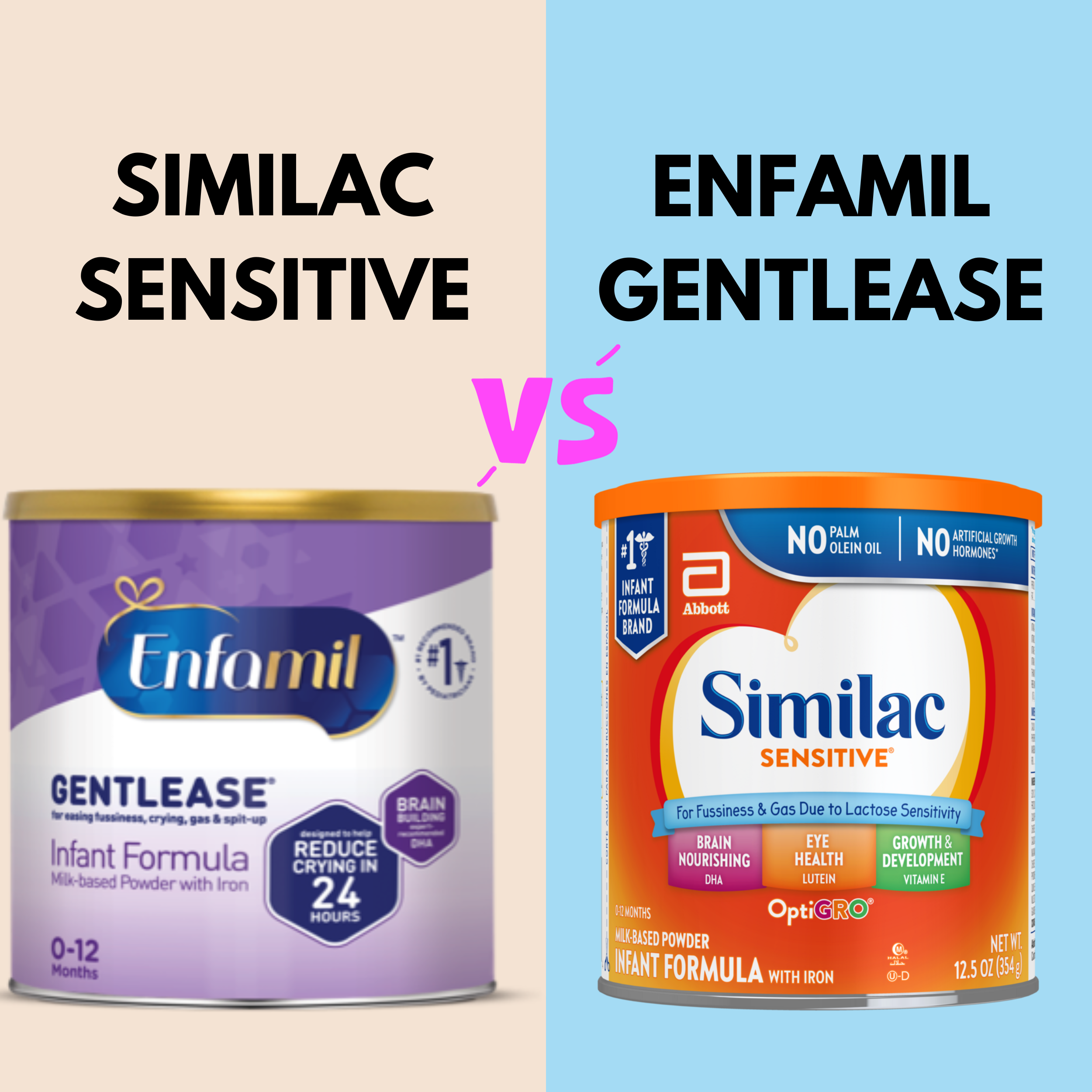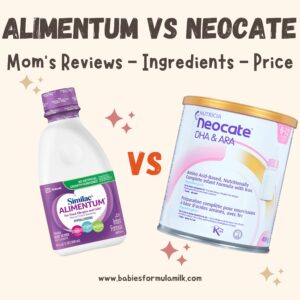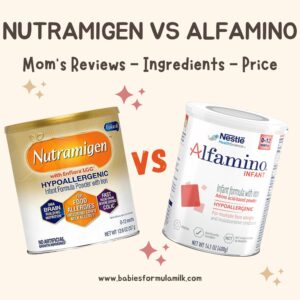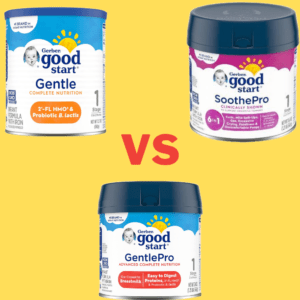Key Differences Between Enfamil Gentlease and Similac Sensitive:
Enfamil Gentlease is a partially hydrolyzed and lactose-reduced (80%) formula, sugar-free, and effective for gas and colic while Similac Sensitive is more lactose-reduced (99%), palm oil-free, with a prebiotic, ideal for fussiness and budget-conscious parents.

“When you buy something using my links, I may earn a small commission at no additional cost to you. This is a kind of support to me. This website doesn’t accept money for reviews. “
The Best One?
The choice between Similac Sensitive and Enfamil Gentlease depends on your baby’s individual needs and preferences. Both formulas are designed to address digestive sensitivities and have their strengths. Neither is definitively better than the other, as what works best for one baby may not work as well for another. Here are some factors to consider when making your decision:
Enfamil Gentlease appears to be a favorable choice for babies who have mild milk and lactose allergy, as it is partially hydrolyzed and lactose-reduced. It has demonstrated good results in addressing issues such as gas, soft stomachs, colic, and spit-up. The fact that it is sugar-free and rich in minerals is also a positive aspect. Additionally, its ease of mixing adds to its convenience.
Similac Sensitive is also a strong contender, with a high level of lactose reduction (99%) and being palm oil-free. It contains prebiotics, which can be beneficial for a baby’s gut health. Its rich protein and carbohydrate content ensures balanced nutrition. Similac Sensitive is reported to address fussiness and reflux effectively, and it is noted for having good taste. Moreover, it’s less expensive, which can be a significant consideration for many parents.
Mom’s Reviews Comparison:

Similac Sensitive and Enfamil Gentlease are both well-regarded infant formulas designed to address digestive sensitivities in babies, but they do have some differences in terms of mom’s reviews:
Positive Reviews for Similac Sensitive:
- Good for Fussiness: Many moms have reported that Similac Sensitive effectively helps alleviate fussiness in their babies, indicating that it can be soothing for infants with sensitive stomachs.
- Good Taste: Some parents appreciate that their babies seem to enjoy the taste of Similac Sensitive, which can make feeding a more pleasant experience.
- Good for Reflux: Similac Sensitive has received positive feedback for its ability to reduce reflux symptoms in some infants.
- Less Expensive: Some parents find Similac Sensitive to be a cost-effective option for addressing their baby’s digestive issues, which can be a significant benefit for budget-conscious families.
Negative Reviews for Similac Sensitive:
- Mixing: it is too foamy and sometimes it’s hard to mix it. The solution to this problem is to use Dr. Brown bottles because it mixes well and the bubbles are no longer found especially if you swirl the bottle.
- May cause gas: some parents reported that it might contribute to gas in some babies. these babies need a more sensitive formula.
Positive Reviews for Enfamil Gentlease:
- Good for Gas: Enfamil Gentlease is highly praised for its effectiveness in reducing gas and colic in babies, which can be a significant relief for parents.
- Good for Soft Stomachs: Many moms have found that it’s gentle on their baby’s stomach, making it easier for their little ones to digest.
- Less Colic: Enfamil Gentlease is often recommended by parents who have experienced reduced colic symptoms in their infants after using it.
Negative Reviews for Enfamil Gentlease:
- Bad Taste: A few reviews mention concerns about the taste of Enfamil Gentlease, although taste preferences can vary among babies.
- No RTF Form: Unlike some other formulas, Enfamil Gentlease may not be available in a ready-to-feed (RTF) form, which can be less convenient for some parents.
Related: Enfamil Neuropro Vs Enfamil Gentlease: Full Comparison
Ingredients Comparison:
Similac Sensitive and Enfamil Gentlease are both specialized infant formulas designed to address digestive sensitivities in babies. When comparing these formulas in terms of their ingredients, some key differences and similarities stand out:
Protein Source:
- Similac Sensitive uses Milk Protein Isolate as its protein source. Milk protein isolate is a concentrated form of milk protein, typically obtained by separating milk components like whey and casein from water, lactose, and fat. It’s a valuable source of high-quality protein and essential amino acids,
- Enfamil Gentlease utilizes Partially hydrolyzed nonfat milk and Whey protein concentrate solids (soy) as its protein sources. This means that the proteins in Enfamil Gentlease are partially broken down, which can make them easier for some babies to digest.
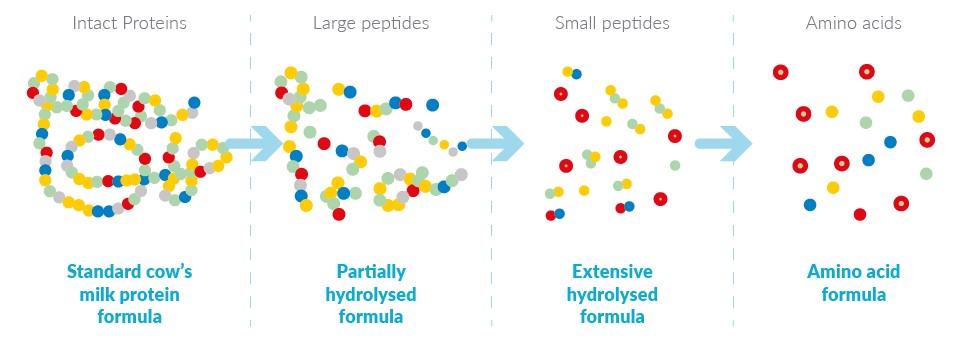
Whey to Casein Ratio:
- Similac Sensitive has a whey-to-casein ratio of “18:82,” which leans more towards casein.
- Enfamil Gentlease has a whey-to-casein ratio of “60:40,” which is closer to the natural ratio found in breast milk. This ratio may contribute to its easier digestibility.
Whey protein is the more soluble and quickly digestible of the two proteins whereas Casein protein is the less soluble and slower-digesting protein in milk.
Related: Similac Sensitive Vs. 360 Total Care Sensitive
Carbohydrate Source:
- Similac Sensitive’s carbohydrate source includes 1% Lactose, Corn Syrup, and Sugar. The lower lactose content makes it suitable for babies with lactose sensitivity.
- Enfamil Gentlease derives its carbohydrates from 20% Lactose and 80% Corn syrup solids. Despite the higher lactose content, Gentlease is easier for some babies with lactose sensitivity to tolerate. Furthermore, it is sugar-free.
Fat Source:
- Both formulas share similar fat sources, including High Oleic Safflower Oil, Soy Oil, Coconut Oil, and the addition of DHA/ARA. These fats help support brain and eye development in infants.
- However, Gentlease has palm oil which is a concern for some parents.
Extra Features:
- Similac Sensitive includes OptiGro feature which is a blend of nutrients found in some infant formulas, including DHA and ARA for brain and eye development, lutein for eye health, vitamin E as an antioxidant, and nucleotides for immune system support. It aims to mimic some of the beneficial elements of breast milk to aid in the healthy growth and development of infants.
- Enfamil Gentlease does not feature any additional proprietary blends or “extra” features beyond its primary formula.
Prebiotics:
- Similac Sensitive contains “Short-chain Fructooligosaccharides” (FOS), which are prebiotics that support a healthy gut flora.
- Enfamil Gentlease does not contain prebiotics as an ingredient.
Generic Brands:
- Similac Sensitive has more generic brands available (7) compared to Enfamil Gentlease (6), which may offer parents more cost-effective alternatives. I wrote an article about generic brands of Similac Sensitive and Pro Sensitive if you want to check.
Nutrients Comparison:

Protein, Fat, and Carbohydrates:
Similac Sensitive and Enfamil Gentlease have fairly similar profiles when it comes to micronutrients and vitamins, but there are some slight variations:
Similac Sensitive contains slightly lower amounts of protein (2.1g) and carbohydrates (10.9g) compared to Enfamil Gentlease, which has 2.3g of protein and 10.8g of carbohydrates. The fat content is almost similar, with Similac Sensitive at 5.4g and Enfamil Gentlease at 5.3g.
Vitamins:
- Enfamil Gentlease offers slightly more Vitamin E (2 IU) compared to Similac Sensitive (1.5 IU), supporting antioxidant function and immune health.
- Enfamil Gentlease also provides slightly more Vitamin K (9 mcg) compared to Similac Sensitive (8 mcg), which is important for blood clotting.
- Similac Sensitive has slightly higher levels of Vitamin B1 (100 mcg) and Vitamin B2 (150 mcg) compared to Enfamil Gentlease (80 mcg and 140 mcg, respectively).
- Similac Sensitive provides a bit more Niacin (1050 mcg) compared to Enfamil Gentlease (1000 mcg), which plays a role in energy metabolism.
- Enfamil Gentlease has slightly more Folic Acid (16 mcg) compared to Similac Sensitive (15 mcg), important for cell division and tissue growth.
- Enfamil Gentlease also offers slightly more Pantothenic Acid (500 mcg) compared to Similac Sensitive (450 mcg), which is involved in energy production.
- Similac Sensitive contains more Biotin (4.4 mcg) compared to Enfamil Gentlease (3 mcg), supporting skin, hair, and nail health.
- Enfamil Gentlease provides more Vitamin C (12 mg) compared to Similac Sensitive (9 mg), which supports the immune system and skin health.
- Both formulas contain the same amounts of Choline (24 mg) but Similac Sensitive has more Inositol (24 mg). Choline and Inositol are important for brain and nervous system development.
Minerals:

Enfamil Gentlease contains more magnesium, zinc, manganese, selenium, sodium, and potassium while Similac Sensitive has more calcium, phosphorus, copper, and chloride.
Now let’s see the role of these minerals to make a decision based on your baby’s needs:
- Calcium: Builds strong bones and teeth, and supports nerve function.
- Phosphorus: Works with calcium for bone health, and aids energy metabolism.
- Magnesium: Important for muscle and nerve function, and DNA synthesis.
- Zinc: Supports the immune system, wound healing, and sensory functions.
- Manganese: Involved in metabolic processes and bone formation.
- Copper: Needed for blood cell formation, bone and nerve health.
- Selenium: Acts as an antioxidant, and supports thyroid function and immunity.
- Sodium: Maintains fluid balance, critical for nerve and muscle function.
- Potassium: Supports heart and muscle function, and and helps with fluid balance.
- Chloride: Aids in fluid balance, nerve function, and digestion.
Price Comparison:
| SIMILAC SENSITIVE | ENFAMIL GENTLEASE |
|---|---|
| 12.5 oz 17.46 $ 1.40/oz Buy 12.5 oz HERE 34.9 oz 37.92 $ 1.09 /oz Buy 34.9 oz HERE 32 fl oz 7.82 $ 24.4 ¢/fl oz Buy Ready-to-feed | 12.4 oz $21.52 $1.74/oz Buy 12.4 oz HERE 19.9 oz $32.86 $1.65/oz Buy 19.9 oz HERE 27.7 oz $44.96 $1.62/oz Buy 27.7 oz HERE |
In terms of price, Similac Sensitive and Enfamil Gentlease offer various size options with slightly different price points:
- Similac Sensitive:
- 12.5 oz for $17.46 ($1.40/oz)
- 34.9 oz for $37.92 ($1.09/oz)
- 32 fl oz for $7.82 (24.4 ¢/fl oz)
- Enfamil Gentlease:
- 12.4 oz for $18.26 ($1.47/oz)
- 19.9 oz for $8.30 ($1.42/oz)
- 27.7 oz for $35.83 ($1.29/oz)
While the price per ounce varies between the two formulas, it’s essential to consider the total cost based on the size you intend to purchase. Similac Sensitive generally offers a lower cost per ounce in small and large sizes, while Enfamil Gentlease is slightly expensive.
Also, Similac Sensitive has a ready-to-feed version which is Great for traveling, easy to use for other caregivers, and comes already sterile.
However, Enfamil Gentlease received a high rating which means that parents didn’t find many problems with this formula
The Best Alternative to Similac Sensitive:
In order to choose an alternative to Similac Sensitive, we must find a formula that is lactose-reduced especially by 99% or 98%. Don’t worry I found them for you:
- Similac Pro-Sensitive: This formula is lactose-reduced by 99%, designed for fussiness and gas, and contains 2′-FL HMO, a prebiotic found in breast milk. It may be suitable if your baby has occasional digestive discomfort. it is the closest one to Similac Sensitive. Check Similac Sensitive vs. Similac Pro Sensitive.
- Similac Total Comfort: This formula is designed to be easy on the digestive system and may be suitable if your baby has issues with gas or fussiness. Read Similac Sensitive Vs. Similac Total Comfort.
- Similac Pro-Total Comfort: Combining features of Pro-Sensitive and Total Comfort, this formula offers comfort for sensitive tummies and 2′-FL HMO prebiotic.
- Similac 360 Total Care Sensitive: This formula is designed to support brain development and a sensitive digestive system. It combines various features to address both aspects.
- Enfamil NeuroPro Sensitive: Enfamil’s NeuroPro line focuses on brain development and includes MFGM and DHA. NeuroPro Sensitive is designed for sensitive tummies.
The Best Alternative to Enfamil Gentlease:
When considering alternatives to Enfamil Gentlease, the best ones are:
- Enfamil NeuroPro Gentlease: This formula combines the benefits of Enfamil Gentlease with the addition of MFGM (Milk Fat Globule Membrane) and DHA (Docosahexaenoic Acid), both of which support brain development. It’s suitable for babies with digestive sensitivity while offering enhanced neurodevelopmental benefits. Check Enfamil Gentlease vs. Neuropro Gentlease.
- Enfamil Reguline: Enfamil Reguline is designed to address common feeding issues such as constipation and discomfort. It contains a unique blend of prebiotics, specifically designed to promote soft stools and support a balanced gut microbiome, potentially alleviating digestive issues. Check Enfamil Gentlease vs. Enfamil Reguline.
Remember that every baby is unique, and what works well for one may not work for another. Your pediatrician is the best resource for guiding you through the transition and ensuring that your baby’s nutritional needs are met while keeping them comfortable and healthy.
